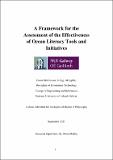| dc.description.abstract | In order to assess the effectiveness of Ocean Literacy (OL) tools, it is necessary to gather data on the usage of the tools, and their impact on the participants’ ocean literacy. This is to say, their awareness, knowledge, attitudes, behaviour etc. with respect to our interactions with the ocean. The framework for assessing ocean literacy which I developed is based on a review of existing research related to the assessment of ocean and environmental literacy. Based on the DAPSIWR framework, I designed and developed an online causal mapping tool and tested the tool. No tool of this type already existed elsewhere. The causal mapping tool allows domain experts to capture DAPSIWR based causal models of topics of concern related to the ocean and to capture knowledge related to the elements of the causal maps and the links between the elements.
The mapping tool was used as the basis for mapping key stories which are used as the test cases in measuring the effectiveness of ocean literacy interventions and tools. These stories are modelled and explored using the DAPSIWR causal modelling framework. The DAPSIWR models allow for key actors and ocean literacy objectives (messages) to be identified. The actors are linked to the elements of the causal models and the ocean literacy objectives are contained in the knowledge which has been attached to the causal map. DAPSIWR models also provide vital context and narrative which can be used as part of the educational and data gathering process. The ocean literacy tools and surveys created as part of this research work are based on topics (key stories) such as Coastal Tourism or Micro- plastics (in cosmetics).
Domain experts used the causal mapping tool to create causal models of ocean literacy topics. I created surveys based on the knowledge captured in the causal models and these surveys were then used as pre- and post-surveys to measure the effectiveness of ocean literacy tools. The surveys that I developed focused on specific ocean related topics and measure the OL dimensions of Knowledge, Attitude, and Behaviour. The data gathered was analysed using correlation analysis, reliability analysis, Rasch analysis, distractor analysis, confirmatory factor analysis and paired t-tests.
The framework developed and used in this research provides an approach which can be used to model specific ocean related topics using DAPSIWR, identify the knowledge associated with the elements of the model, create topic specific surveys based on the identified knowledge, administer the surveys, automatically receive responses to the surveys, and analyse the response data to gain insights. The DAPSIWR models were used for educational purposes and in the creation of surveys on specific topics. The surveys were used as tools to measure the OL of the participants of OL interventions, before and after they took part in the intervention. The interventions were aimed at increasing OL and the participants were required to take a pre- and post-survey. The results of the responses to the pre- and post-surveys were analysed to get a measure of the effectiveness of the interventions. | en_IE |


